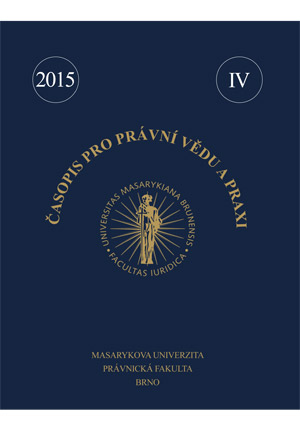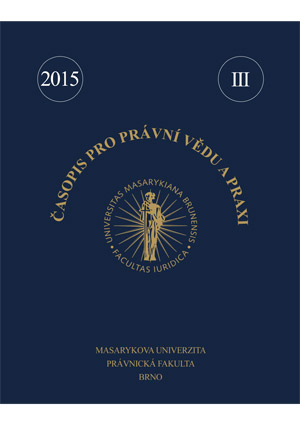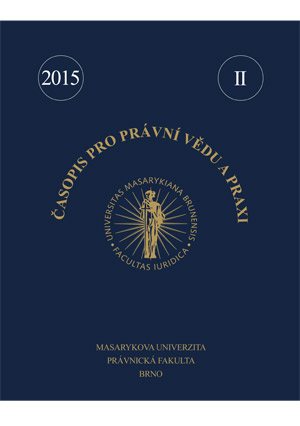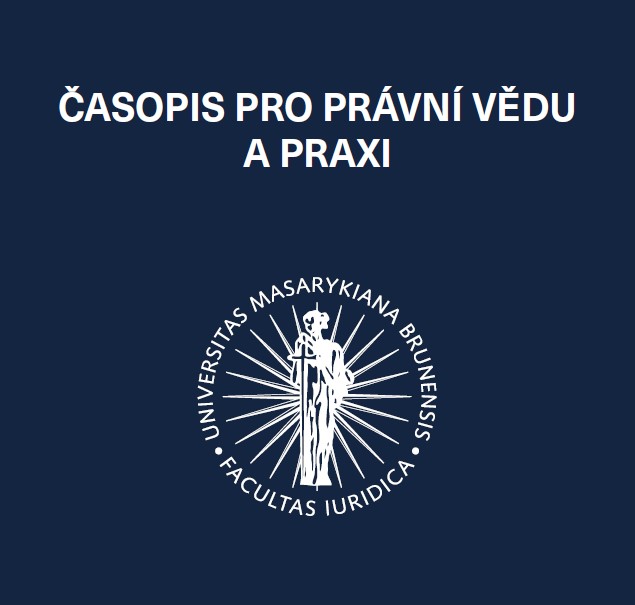
The Business Judgment Rule and its Impact on Austrian Law
The Business Judgment Rule and its Impact on Austrian Law
More...We kindly inform you that, as long as the subject affiliation of our 300.000+ articles is in progress, you might get unsufficient or no results on your third level or second level search. In this case, please broaden your search criteria.

The Business Judgment Rule and its Impact on Austrian Law
More...
This thesis will analyze the way of reception of trio of legal institutes from foreign jurisdictions to Czech Corporations Act 2012 (ZOK). Specifically, the business judgment rule according to section 51 paragraph. 1 ZOK; insolvency test (wrongful trading) according to sec. 68 ZOK; and a one-tier board model of the public limited company. Proclaimed inspiration from foreign legal systems is the common denominator, but at a closer look, it shows on not entirely consistent legislature approach.
More...
This article aims to inform readers about a position of a member in the association and its possible recognition as a consumer.The raised question is whether a member of the association may, under certain conditions, act as a consumer and, if so, under what conditions. This paper tries to answ er this question based on analysis of personal and financial components of the membership, by which is usually every membership of the corporation equipped.
More...
Probably the most contemporaneously discussed topic regarding area of competition law within the EU is the interaction between public and private enforcement of competition. Despite the fact that there is general agreement that it is necessary to support and promote private enforcement of competition law the reality is that successfully claim damages caused by competition law infringement is extremely difficult. Fundamental problem for potential damage claimants is foremost obtaining evidence and information to be able to submit civil action, especially those based on which they would be able to calculate damages. Moreover even with such evidence it is extremely difficult to calculate exact amount of damages due to the character of damages caused by anticompetitive behaviour.
More...
Public procurement is usually considered as a modified private legal relationship with significant public regulation. Therefore is public procurement regulated not only by the Public Procurement Act but also by Civil Code. Contribution deals with the topic of substantial changes in contract, especially in those cases where the contract amendment would cause an imbalance in the position of the contractual parties in favour of the selected contractor sec. § 82 para. 7 fonts. D PPA). Contribution analyses the possible impacts of specific sector regulation in PPA from the perspective of validity of the contract. Paper also compares the information with the concept of invalidity in the Civil Code.
More...
The article describes the basic underlying principles of competition law concerning abuse of dominance, follows with the introduction to relevant aspects of intellectual property law with focus on patents. The core of the article discusses the interaction of patents and competition law. The authors argue that patents can cause increase of market power and lead the undertaking to become dominant. Such dominant undertakings are limited in their market behavior also while exploiting and protecting their patent rights. Potential antitrust issues could occur especially with certain types of patents, such as essential patents and standard essential patents. The authors verify their conclusions with existing case law and conclude with recommendations to undertakings with strong market power active in the patent field on how to avoid the risk of breaching competition law rules.
More...
The payment discipline of debtors decreased significantly in a past few years, which naturally causes complication for creditors, seeking for their claims. The European Union is fully aware of this issue; therefore, strict rules fighting against this issue were adopted via the Directive of the European Parliament and Council 2011/7/EU dated 16 February 2011 on combating late payment in commercial transactions (hereinafter referred to as the “Directive”). The Slovak Republic and the Czech Republic implemented the Directive into their national legal systems. In this article, author analyses new claim of creditors connected with the late payments of debtors, guaranteed by the Directive and implemented into national legal systems - the compensation for recovery costs. This article aims to provide reader with a little insight regarding the compensation for recovery costs from theoretical as well as practical point of view, pointing out on some difficulties and ambiguities connected with interpretation of national legal rules. The article contains comparison of Slovak and Czech legislation, which differs from each other despite the fact that both countries have transposed the very same Directive.
More...
This article deals with the term “commercial company”, possibilities of its definition and its refection from the Czech and EC Law perspective. In the Czech Republic the legal regulation of commercial companies, which are considered as legal persons (entities), differs from the regulation of other legal entities. This approach is given due to the fact that each commercial company is regarded as a businessman even though it is actually engaged in non profit activities. In other words to a commercial company is attributed “business status” regardless its actual activity. This approach supports also connection of used words “commercial” “company”, which represents a group or an entity formed for the purpose of running business (commerce). The overwhelming part of regulation of commercial companies is included in the Commercial Code and in case of supranational companies furthermore in EU regulations and special accompanying Acts adopted by each member state. Due to the aforementioned general definition or comprehension of the term “commercial company” can’t be found.
More...
In this paper we analyze the term market power, its assessment, measurement and influence on practical application of competition law. Most important aspects that affect market power and are commonly assessed by competition authorities are described. Emphasis is put on the fact that market power cannot be substituted with market share and it is necessary always assess also other aspects like character of relevant market, barriers of entry, countervailing buyer power etc. Methods for direct measurement of market power are also described, especially so called Learner index and possibilities of its application within competition law practice. Use of direct methods and generally more economic approach to competition law within measurement of market power is evaluated on the base of Czech and foreign competition authorities practice. We conclude with regard to practical applicability of direct methods for assessment of market power before courts in the Czech Republic.
More...
The aim of this paper is to analyse changes in the general conception of legal bodies (especially their will declarations) which arise from the Czech passed recodificational concept. One of the gravest modifications of the present approach consists in the fact that the legal bodies are no longer going to be able to act directly; instead they are going be represented all the time. This concept is of course one the possible approaches; however, the wording of the rule of law forming this principal is imperfectly drafted. That implicates considerable troubles.
More...
Reakce na zásadní změny normativního základu, kolem něhož jsou vybudovány pedagogické obory občanského a obchodního práva, se dá hypoteticky očekávat někde mezi dvěma (doufám, že rovněž jen hypotetickými) extrémy: - nechat věci „při starém“ a přizpůsobit se jen novému obsahu úprav - „nenechat kámen na kameni“ a vých předpisech provést „revoluci“ ve výuce soukromého práva.
More...
The article assesses the legal regulation of Czech joint stock and limited liability companies in the light of the recodification statutes (the Companies Act No 90 of 2012 and the Civil Code No 89 of 2012) which are to come into effect on 1 January 2014. It emphasises the massive stratification of the legal regulation of these companies resulting from the strengthening of the subsidiarity of civil law and greater application demands on the average user associated with it. It alerts to the major changes brought by the recodification, especially the possibility of incorporating shares in a limited liability company in securities, reduction of the minimal registered capital of a limited liability company and breaking the ban of unilateral withdrawal of a member from a company. The article also highlights the option of issuing innominate types of shares in the joint stock companies and limited liability companies as an expression of growing freedom of contract. It provides a critical view of the incomplete regulation of monistic organisational structure of the joint stock companies.
More...
Obchodní korporace a smlouvy, resp. obligace jsou si v mnohém blízké a rozdíly mezi nimi se mnohdy smazávají – dnes umocněno mj. i novým pojetím věci v právním smyslu. Mnohostrannost korporace a otevřenost dalších participujících na ní nás nutí k diskusi nejen o účelu a podstatě korporace, ale také o ochraně společníků, a ne vždy jen těch minoritních. Korporace sleduje dílčí účel a píše se, že ty obchodní pak sledují účel podnikatelský, což některé vede k závěru, že shareholder primacy nefunguje a je třeba ho modifikovat. Diskutují se proto anglický enlightened shareholder model (čl. v 172 Companies Act 2006), productive coalition model, stewardship model (UK Stewardship Code 2010), corporate social (and enviromental) responsibility model a v neposlední řadě samozřejmě také stakeholder model.
More...
Competition law is still not a separate part of the theory and universities programmes. Author briefly comments and describes major disciplines of competition taking into account not only local but namely European law. Besides standard questions which are commonly published, a special focus is granted to more business oriented themes like public procurement, public subsidies, sector regulation, block exemptions or management/employment questions linked to competition. All issues are discussed with an aim to attract further focus of academics on them and to define major questions to be delt with in all described areas.
More...
Ustanovení o právní regulaci nekalé soutěže budou po nabytí účinnosti nového občanského zákoníku obsažena v tomto právním předpise namísto současné právní úpravy v obchodním zákoníku. Právní úprava nekalé soutěže byla podle důvodové zprávy3 do nového občanského zákoníku zakotvena především proto, že „hospodářská soutěž není omezena jen na podnikatele, nýbrž i na jiné soutěžitele a její úprava zasahuje i soukromá práva a povinnosti dalších osob (např. tzv. osob pomocných). Další podstatný důvod této systematické změny je v tom, že i za situace, kdy je právo hospodářské soutěže upraveno zvláštním (zákonem č. 143/2001 Sb.), neobsahuje tato úprava soukromoprávní ustanovení, která je tudíž potřebné zařadit do občanského zákoníku“.
More...
Škodné konanie štatutárneho orgánu kapitálovej spoločnosti môže spôsobovať priamy či nepriamy následok v právnom postavení tretích osôb, ktorými rozumieme predovšetkým spoločníkov kapitálovej spoločnosti, ktorej štatutárny orgán škodu spôsobil, a veriteľov tejto spoločnosti. V právno – teoretickej rovine sa ustálilo, že v načrtnutom smere nie je možné postavenie spoločníkov spoločnosti a veriteľov spoločnosti striktne odlišovať. Uplatňovanie nárokov veriteľov zo zodpovednosti za škodu voči štatutárnym orgánom kapitálovej spoločnosti vo svojom mene a na vlastný účet pritom predstavuje jeden spomedzi viacerých nástrojov ochrany veriteľov kapitálovej spoločnosti, ktorých legálna uplatniteľnosť je značne oklieštená, čo spôsobuje nízku vymožiteľnosť ich práv a oprávnených nárokov v právnych vzťahoch a stavia ich de facto do pozície slabšej strany, a to napriek držbe pohľadávky, ktorá by za štandardných okolností mala znamenať výhodu v právnom postavení oproti iným subjektom príslušného právneho vzťahu.
More...
This article is dedicated to the problem of maturity of pecuniary obligations and of penalty interest as a mechanism afflicting the debtor, who didn’t pay to his creditor duly and in time, in civil and labour law in the Czech Republic.This article deals also with the place of fulfilment of civil and labour pecuniary obligations, the commencement and the termination of debtor’s delay, the commencement and the termination of debtor’s duty to pay to the creditor the penalty interest and further with the form of determination of the amount of penalty interest in these relationships.This article is based on actual legal regulation to the 1st April 2012 and on legal regulation included in the Act No. 89/2012 Coll., Civil Code, as amended, coming into force on the 1st January 2014, on established judicature and on opinions of various experts.
More...
In this paper the author addresses in detail the processing and approximates the historical development of European Works Councils from their anchorage in the draft of European company statute to their separate adjustment in the EWC Directive. He displays a fairly difficult process that led to the adoption of mandatory adjustment of the issue. At the same time he points and details the various predecessors with the increased emphasis on the direct predecessors which are the Fifth directive and the Vredeling directive. Outline the main arguments of the social partners and Member States about different proposals He addresses in detail the preparatory phase which preceded the adoption of the Directive. In conclusion generalizes the main efforts of the EU at this level of employees’ participation.
More...
In this paper the author offers a critical view of the relevant market concept which is one of the key terms in competition (antitrust) law and strongly influences the end results of competition law regulation. The author presents the standpoint that in the current, quite narrow perception with strong legal meaning attributed to defined market boundaries, it has some significant shortcomings. Three levels are mentioned in the text to consider the issue: (i) too narrow market boundary decinition, but connected with significant normative effects, (ii) imperfection of methods adopted for market boundary definition, and (iii) imperfect adoption of these methods in application practice. The author therefore suggests certain modifications of the entire concept accompanied by a mitigation of the significance attributed to the whole institute.
More...
This article discusses the possibilities of a legal person to become the rightful tenant. It's focused on the position of legal entity as tenant in the current version of the Civil Code and Supreme Court's case law. The text is divided into two parts. The first part deals with the analysis of contradictory opinions presented in the case law of the 21st and 26th Chamber of the Supreme Court. The text is primarily focused on the two judgements which open the question of equality of legal and natural persons in the rental relationship. Although the case law of the 21st Chamber of the Supreme Court refers to rent of cooperative flats and escheat of membership in housing cooperative, it may have influence on the position of legal entity as tenant in general. In the second part the author follows arguments contained in the judgements of both chambers and also comes with other reasons, which are with the arguments arising form the judgements closely bound. Finally the text heads towards opinion that legal entity is possible to become tenant as well as natural person.
More...